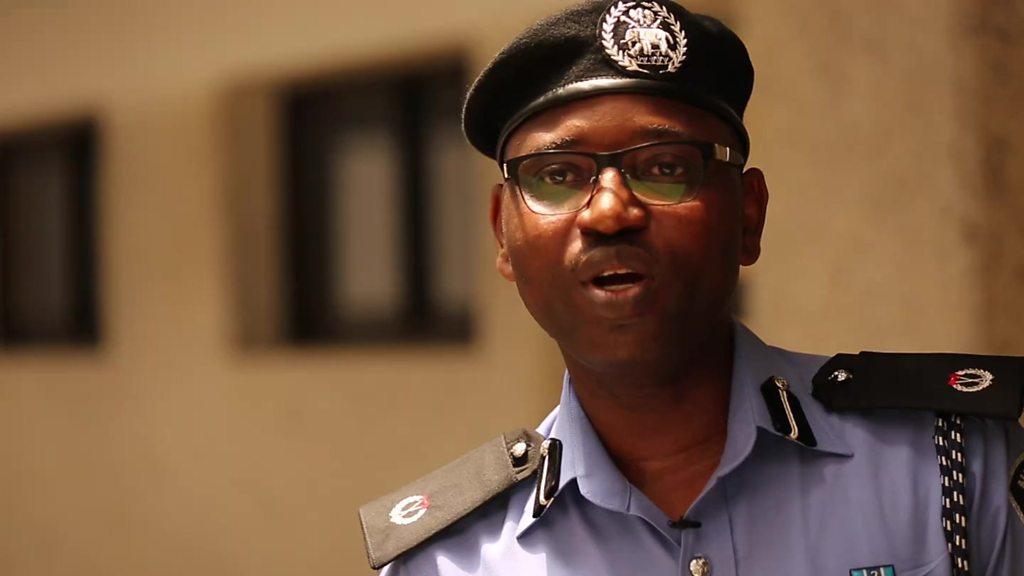End Swat: Nigerians reject police unit replacing hated Sars
- Published
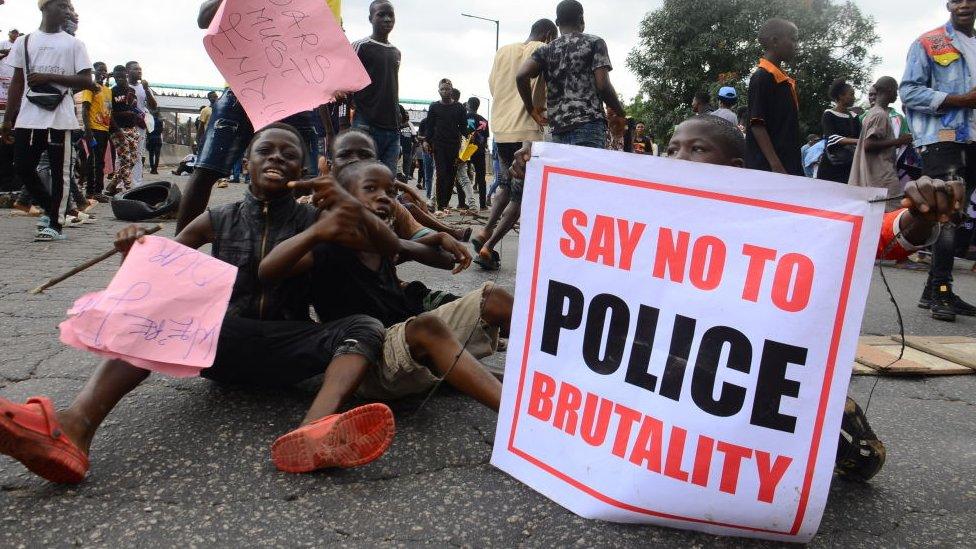
Thousands of Nigerians have taken to the streets across the country to call for police reforms
Nigerians are outraged by the unveiling of a new police unit to replace a notorious agency that was disbanded following public outcry over its alleged human rights abuses.
The head of the police Mohammed Adamu announced that Swat would carry out the duties which were done by the Special Anti Robbery Squad (Sars).
But many are using the hashtag #EndSwat on Twitter to oppose the new unit.
They see the changes as not enough to reform the police.
Thousands of Nigerians have been protesting against the frequent cases of illegal detentions, assaults and shootings by Sars officers.
The mostly peaceful demonstrations have however been disrupted by police. Amnesty International said on Tuesday that 10 people were killed in the protests but other reports give a lower figure.
Some of Nigeria's biggest music stars, including Davido and Falz, have thrown their weight behind the demonstrators, who have been galvanising support on Twitter under the #EndSARS hashtag.
On Tuesday, they marched in the oil hub of Port Harcourt in defiance of a ban on demonstrations imposed by the state governor.
Protests were also held in the commercial hub, Lagos, the country's capital, Abuja, and four other cities.
What did the police chief say?
In a statement on Tuesday, Mr Adamu said all Sars staff will undergo a psychological and medical examination before further training and redeployment.
The new Special Weapons and Tactics (Swat) team will fill the gaps left from the dissolution of Sars, he said.
The police chief also ordered the release of all detained protesters after a meeting with the National Human Rights Commission.
He did not say how many of them were in detention.
Mr Adamu added that Nigerians had the right to protest peacefully and ordered officers to stop using force against them. He acknowledged that the protesters' concerns were genuine and said they would be addressed by the government.
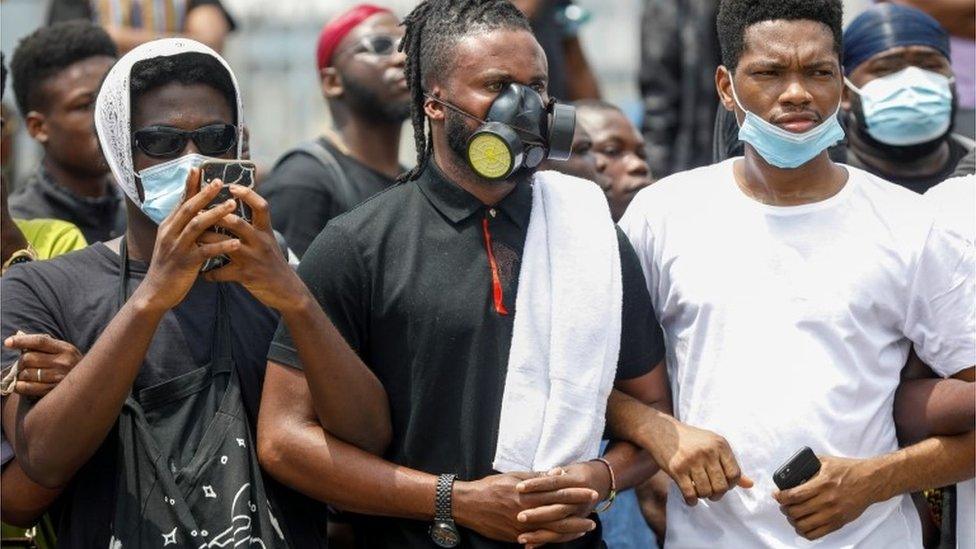
Protesters accuse the police of torture and extra-judicial killings
The meeting also agreed that an independent panel would be set up to investigate allegations of abuse against Sars, and other police units.
On Monday, Mr Buhari promised that the disbandment of Sars was only the first step towards "extensive" reforms within the police force.
What are people saying?
On Twitter, where the protests have been organised, many people are using the hashtag #EndSwat to remind others about their goal of reforming the police.
Allow X content?
This article contains content provided by X. We ask for your permission before anything is loaded, as they may be using cookies and other technologies. You may want to read X’s cookie policy, external and privacy policy, external before accepting. To view this content choose ‘accept and continue’.

Allow X content?
This article contains content provided by X. We ask for your permission before anything is loaded, as they may be using cookies and other technologies. You may want to read X’s cookie policy, external and privacy policy, external before accepting. To view this content choose ‘accept and continue’.

Others suspect that the government is trying to sow division amongst the protesters and are urging solidarity.
Allow X content?
This article contains content provided by X. We ask for your permission before anything is loaded, as they may be using cookies and other technologies. You may want to read X’s cookie policy, external and privacy policy, external before accepting. To view this content choose ‘accept and continue’.
Protests may change Nigerian politics

Within an hour of the announcement that a new unit would be set up to "fill in the gaps" left by the dissolution of Sars, #EndSwat started trending in Nigeria.
The swiftness of the response is reflective of the energy of these protests. Demonstrators will not be easily placated.
The tenacity and levels of organisation of the protesters have taken everyone by surprise.
But something else is happening online. Galvanised by the levels of participation in the protests, commentators have started looking ahead to the next general elections in 2023. There's already talk of capitalising on the gains made during #EndSARS campaign to reenergise Nigerian politics.
However, the next couple of days will be a key test of the endurance of these protests.
They've been going on for a week but heavy rains continue to fall in Lago, which could dampen demonstrations.
If protesters are able to maintain momentum despite these challenges, it could signal a shift in the status quo in Nigeria.

How did Sars operate?
The latest round of protests were prompted by footage of officers pulling two men out of a hotel in Lagos into the street and shooting one of them.
The footage, leaked to the media, provoked outrage and led many to share stories of brutality attributed to the unit.
Who is policing Nigeria's police?
Earlier this year Amnesty said it had documented at least 82 cases of torture, ill treatment and extra-judicial execution between January 2017 and May this year.
The victims were mainly men aged between 18 and 35 from poor backgrounds and vulnerable groups. Many of those tortured were beaten with sticks and machetes and denied medical attention, the group said.
The "systemic use of torture... points to an absolute disregard for international human rights laws and standards", Amnesty said.
Why didn't reform work?
The #EndSARS hashtag was first thought to have been used in 2018, but it emerged again a fortnight ago.
There have been earlier attempts to reform the notorious squad. In 2018 Vice-President Yemi Osinbajo ordered that its management and activities be overhauled.
Then last year, a specially formed Presidential Panel on the Reform of the Special Anti-Robbery Squad recommended reforms along with the dismissal and prosecution of named officers accused of abusing Nigerians.
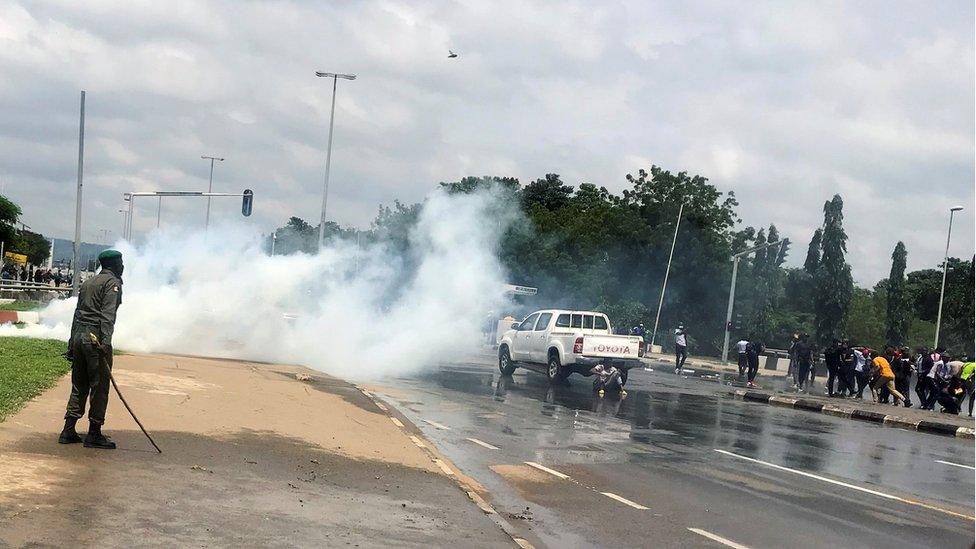
Nigerian police have used tear gas and water cannon to diisperse protesters
At the time, President Buhari gave the head of police three months to work out how to implement the recommendations, but critics say little changed.
Previously police chiefs ordered a reform of Sars in 2017, in the aftermath of a viral video of a man allegedly killed by police, and also in 2010 when instructions were given to disband satellite offices.
Yet the unit has continued to exist despite these announcements.
- Published13 October 2020
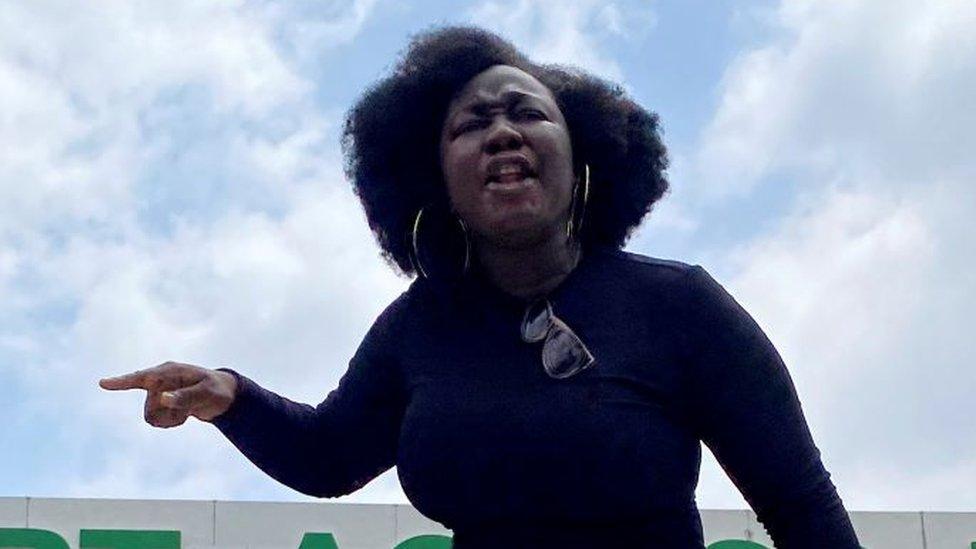
- Published1 October 2020
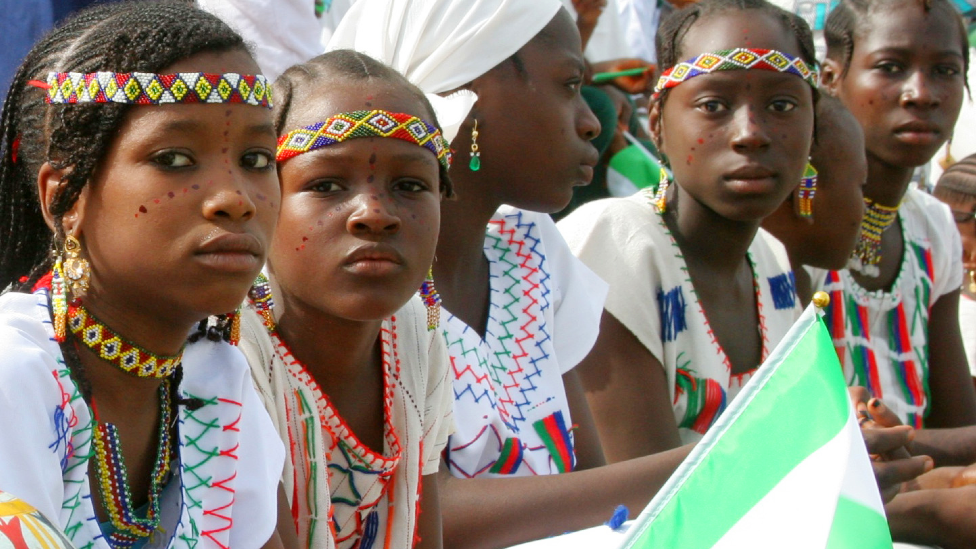
- Published17 November 2016
